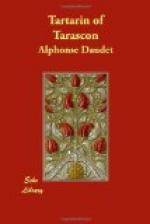When he read this, the son of Tarascon reddened, blanched, and shuddered. All Tarascon appeared unto him: the club, the cap-poppers, Costecalde’s green arm-chair, and, hovering over all like a spread eagle, the imposing moustaches of brave Commandant Bravida.
At seeing himself here, as he was, cowardly lolling on a mat, whilst his friends believed him slaughtering wild beasts, Tartarin of Tarascon was ashamed of himself, and could have wept had he not been a hero.
Suddenly he leaped up and thundered:
“The lion, the lion! Down with him!”
And dashing into the dusty lumber-hole where mouldered the shelter-tent, the medicine-chest, the potted meats, and the gun-cases, he dragged them out into the middle of the court.
Sancho-Tartarin was no more: Quixote-Tartarin occupied the field of active life.
Only the time to inspect his armament and stores, don his harness, get into his heavy boots, scribble a couple of words to confide Baya to the prince, and slip a few bank-notes sprinkled with tears into the envelope, and then the dauntless Tarasconian rolled away in the stage-coach on the Blidah road, leaving the house to the negress, stupor-stricken before the pipe, the turban, and babooshes — all the Moslem shell of Sidi Tart’ri which sprawled piteously under the little white trefoils of the gallery.
EPISODE THE THIRD AMONG THE LIONS
I. What becomes of the Old Stage-coaches.
Come to look closely at the vehicle, it was an old stage-coach all of the olden time, upholstered in faded deep blue cloth, with those enormous rough woollen balls which, after a few hours’ journey, finally establish a raw spot in the small of your back.
Tartarin of Tarascon had a corner of the inside, where he installed himself most free-and-easily: and, preliminarily to inspiring the rank emanations of the great African felines, the hero had to content himself with that homely old odour of the stage-coach, oddly composed of a thousand smells, of man and woman, horses and harness, eatables and mildewed straw.
There was a little of everything inside — a Trappist monk, some Jew merchants, two fast ladies going to join their regiment, the Third Hussars, a photographic artist from Orleansville, and so on. But, however charming and varied was the company, the Tarasconian was not in the mood for chatting; he remained quite thoughtful, with an arm in the arm-rest sling-strap and his guns between his knees. All churned up his wits — the precipitate departure, Baya’s eyes of jet, the terrible chase he was about to undertake, to say nothing of this European coach; with its Noah’s Ark aspect, rediscovered in the heart of Africa, vaguely recalling the Tarascon of his youth, with its races in the suburbs, jolly dinners on the river-side — a throng of memories, in short.
Gradually night came on. The guard lit up the lamps. The rusty diligence danced creakingly on its old springs; the horses trotted and their bells jangled. From time to time in the boot arose a dreadful clank of iron: that was the war material.




